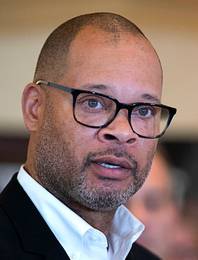Tuesday, May 25, 2021 | 2:53 p.m.

Steve Sisolak

Aaron Ford
CARSON CITY — A year after the murder of George Floyd by a Minneapolis police officer, Nevada Gov. Steve Sisolak today signed two criminal justice reform bills into law.
Assembly Bill 58 allows the state attorney general to investigate potential systemic discrimination in police departments and Senate Bill 50 limits the use of no-knock warrants.
Nevada Attorney General Aaron Ford said the bills came about through community conversations triggered by Floyd’s death.
“When I watched the video of George Floyd’s murder, I thought about it could have easily been me with a knee on my neck,” Ford said. “I thought how it could have easily been one of my own sons.”
Senate Bill 50 requires police to detail to a judge why a no-knock warrant is necessary. They must explain why announcing their presence would create a threat of bodily harm and why there are no other reasonable alternatives. At the scene, an officer trained in the execution of warrants must be present.
“Imagine if suddenly and without warning, armed persons violently entered into your home. In those immediate moments you wouldn’t know what’s going on, let alone what the intention were of those who were entering your space,” Ford said.
Assembly Bill 58 would give Ford’s office the ability to investigate law enforcement and other agencies to determine if systemic discrimination is present. Such investigations in Nevada were previously restricted to the federal Department of Justice.
Sisolak said the bills were needed to bolster trust between the police and some communities.
“Nevadans deserve to feel safe in their own homes and communities, and it's critical that they trust that those charged with protecting them do so with integrity,” Sisolak said in a statement.
Criminal justice reforms should not be viewed as a condemnation of police, Ford said.
“I want to make the broader point that supporting communities of color and lawful policing is not the antithesis of supporting law enforcement,” Ford said. “Recognizing police violence does not make someone anti-police.”
Discussions about criminal justice reform will be ongoing, Ford said.
“Today is also a day of hope, and it’s a day to recognize that the pursuit of justice must be done deliberately, conspicuously and continuously,” he said. “Today we took one more step toward that.”
